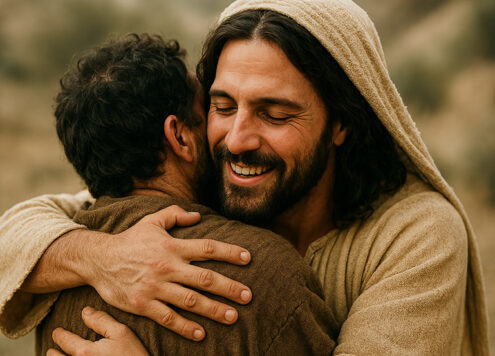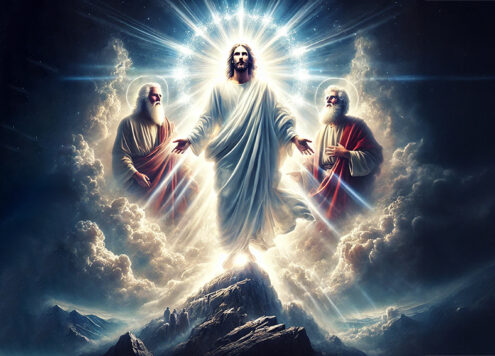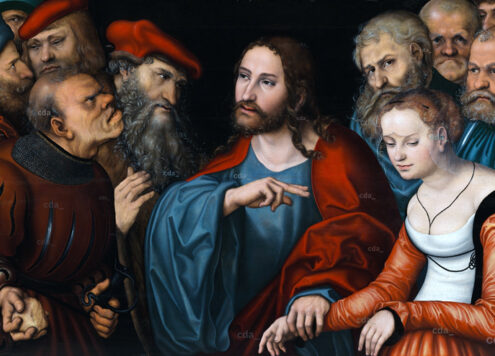The family is the bedrock of society. It is the source of security, love and , at times, exasperation.
At the root of a family’s security is the father. No family is perfect because it is made up of imperfect human beings. Yet, it is the father of the family who imparts to his children direction and discipline ( without being harsh ) in life. In a poll conducted by the Pew Research Center on what provides Americans with meaning in life, 70% mentioned family.
We often make more of a fuss over our mothers on Mothers Day than our dads on Fathers Day. That would be a grave mistake for Dads are the stabilizing influence without which a family would find it hard to function. The presence of a loving father in the house greatly increases a child’s chances of success, physically and mentally, and it also contributes to a child’s sense of humor. How children love to listen to their father’s jokes and stories, even if they are exaggerated! One father, it is said, is better than a hundred teachers. Plato knew well a father’s power of teaching by example. Speaking of fathers, he said, “the best way of training the young is to train yourself at the same time; not by criticizing the young, but to be seen as never doing anything that would embarrass them.”
The past year and a half has, undoubtedly, been trying for most, if not all American families. From loss of jobs to school closings, from seething sicknesses to devastating deaths, the scourge of the pandemic has touched every family in some way. In spite of these trials and crises, the American family has remained resilient. In fact, 50% of Americans between the ages of 18 and 29 say their relationship with their fathers and immediate family members had strengthened during the coronavirus outbreak. That’s why so many of them felt comfortable moving back home with dad.
This third, weekend of June is when we celebrate Father’s Day just as Mother’s Day is celebrated on the second weekend of May. Fathers come in all ages, shapes and varieties: farmers, postmen, truck drivers, construction workers, fruit and vegetable pickers, doctors, lawyers, plumbers, electricians, carpenters, milkmen, gardeners or politicians. The one thing they all have in common is their love for their families.
After the West Virginia coal mining disaster of December 6, 1907 that killed 361 men, 250 of them fathers, Grace Golden Clayton (1875–1958), the daughter of a Methodist minister, proposed a service to honor all fathers. The idea was taken up by her local pastor, Reverend Robert T. Webb, of the Williams Methodist Episcopal Church, South, in Fairmont, West Virginia (now the Central United Methodist Church).
A memorial service was held on July 5, 1908; Clayton chose that day because it was the Sunday closest to her own father’s birthday. The remembrance recognized Clayton’s father and the 1,000 children’s miner fathers, but this local event did not gain national attention, did not become an annual event, was not promoted and no one outside of the area knew anything about it.
In 1909, Sonora Smart Dodd (1882–1978) of Spokane, Washington, was inspired by Anna Jarvis, the founder of Mother’s Day in the United States. While attending a Mother’s Day church service in 1909, 27-year-old Sonora came up with the idea of a day to be set aside to celebrate the love and devotion of a father to his family. She was moved to do this by the extraordinary dedication of her own father, William Jackson Smart, a farmer and Civil War veteran, who as a single parent raised Sonora and her five brothers singlehandedly, after his wife Ellen died giving birth to their youngest child in 1898.
A few months later, Sonora convinced the Spokane Ministerial Association and the YMCA to set aside a Sunday in June to celebrate fathers. Thus, on June 19, 1910, the first Father’s Day made its appearance. Handicapped fathers received presents personally from Sonora; boys from the YMCA wore lapels with fresh-cut roses (red for living fathers, white for the deceased), and the city’s ministers wrote and delivered homilies celebrating fatherhood.
By 1916 President Woodrow Wilson observed the day. Eight years later, President Calvin Coolidge signed a resolution in favor of Father’s Day “to establish more intimate relations between fathers and their children and to impress upon fathers the full measure of their obligations.” In 1966, President Lyndon Johnson signed an executive order fixing the third Sunday in June as the time to celebrate Father’s Day in America. (Catholic countries such as Spain and Portugal observe March 19—the Feast of St. Joseph—as Father’s Day.) Finally, in 1972, six years before Sonora’s death, Congress passed an act officially making Father’s Day a national holiday.
Everyone has his or her own story of a father’s love for his family. A story that comes to my mind is a conversation I had with my brother about our own Dad back in Ireland. My dad was a farmer. I was vacationing with my brother and his family, far away from Ireland, in the Dominican Republic when Pat said to me, reminiscing about the old days:
“You remember when Dad used to bed down the animals in the barn at night, and we took turns holding the old lantern while he was working?”
“I recall those days vividly,” I replied.
“Well,” Pat continued, fondly, “I thought then, there had to be a better way of making a living than that.”
We both laughed.
“And now, what do you think?” I pried, curiously.
“Now, I ask myself if I’ll ever be that good!”
The constant acts of love and sacrifice of a father for his family, no matter how modest, never go unnoticed by his family. They follow his family wherever it goes for they are the precious seeds that inform and influence the character of his offspring for life.
Today is Father’s Day. Beyond the giving of commercial gifts, let us remember with gratitude, love and affection the fathers who gave us birth, who molded us, and who, indelibly, affected who we are today.
HAPPY FATHER’S DAY!
—Fr. Hugh Duffy











13 Comments
Brian W
In a Family of Seven children, each one of us in our hearts new we were dad’s favorite. After all I put my Father through – One thing I New for certain, My Father may not have always liked my actions – But he unconditionally LOVED me. As I unconditionally love my adult children ! I don’t miss my Dad – because he is right here with me with every breath I take.
Hugh Duffy
Wow! What a beautiful tribute to your dad, Brian. Thanks for sharing.
Tom Walsh
Thank you Father Hugh. Inspiring and loving as always.
Dr. G. Heath King
It is to the credit to Pope Francis that he has expressed the crisis of our times in his exhortation Amoris Laetitia: On Love in the Family, issued in 2016.
“We often hear that ours is ‘a society without fathers.’ In Western culture, the father figure is said to be symbolically absent, missing or vanished.”
Dr. G. Heath King
It is to the credit to Pope Francis that he has expressed the challenge of our times in his exhortation Amoris Laetitia: On Love in the Family, issued in 2016.
“We often hear that ours is ‘a society without fathers.’ In Western culture, the father figure is said to be symbolically absent, missing or vanished.”
Dr.G. Heath King
For those attuned to symbolism one could already sense that a renewed spiritual counterflow to the fragmented family began with the landing of a Sea Gull on the smoke stack just before the appearance of the white smoke signaling the advent of Francis as the new papal leader of our times.
Dr. G. Heath King
For those attuned to symbolism one could already sense that a renewed spiritual counterflow to the fragmented family began with the landing of a Sea Gull on the smoke stack just before the appearance of the white smoke signaling the advent of Francis as the new papal leader of our times.
Dr. G. Heath King
Yet what makes its appearance at that time significant is that the sea gull is symbolically the messenger from heaven to earth . In dream interpretation it symbolizes the cohesion of the family, the social unit. As a species it is quite intelligent though without deception and theft like the raven and crow.
BART VAN HOUSEN
Also, Happy Father’s Day to you Father Duffy! You have a very large family about the world, who love you dearly.
Being second of nine, my Father was a true Drill Instructor (DI).When in trouble, I had a wonderful “UNCLE” to help me understand why my Father was so strict with harsh demands.I hope on this day, every one, will also remember their favorite Uncle” who is like a second Father to you!
Hugh Duffy
You make a good point, Bart, about the role of an uncle as a substitute father or father figure. I think we all can identify with that.
Nancy Tupas
Absolutely loved this!! Thank you!!
Marilyn Stack
Beautiful, brings back loving memories. Thank you 💕
Nancy E. Head
Wonderful post. My great-granddaughter, who’s three, went around yesterday wising a happy Father’s Day to one and all. It is a day for all. Happy Father’s Day! God bless!